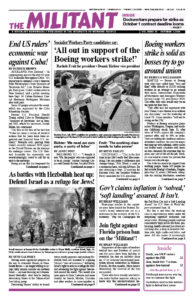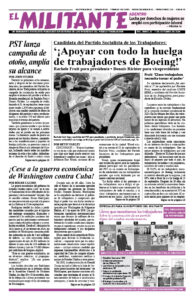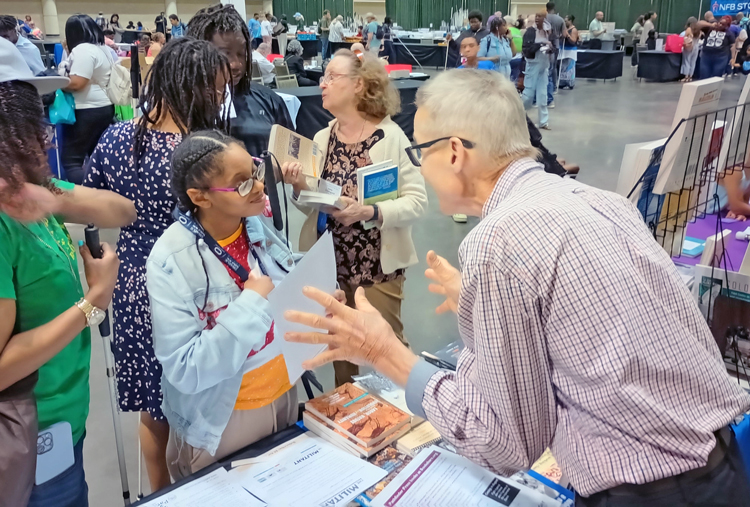ORLANDO, Fla. — The National Federation of the Blind held its annual convention here. These conventions are the largest gatherings worldwide of blind and low vision people, their families, friends and supporters. This year, some 2,600 registered in person and another 600 viewed online. Seventy-five came from abroad. The sessions took place July 3-8.
Pathfinder Press set up a booth, the third time it has done so. Booth volunteers distributed flyers on featured books written by Socialist Workers Party and other revolutionary working-class leaders that are available in Braille and large print on Bookshare.org. These include The Low Point of Labor Resistance Is Behind Us: The Socialist Workers Party Looks Forward by SWP leaders Jack Barnes, Mary-Alice Waters and Steve Clark; The Fight Against Jew-Hatred and Pogroms in the Imperialist Epoch: Stakes for the International Working Class; and Malcolm X, Black Liberation, and the Road to Workers Power, also by Barnes.
Chuck Hietala, a retired over-the-road trucker and Teamster union member from Florida, stopped by the table along with his wife, who is blind. He’s from a union family on the Minnesota Iron Range.
He wanted to discuss the increase in labor resistance over the last year, as more workers are turning to their unions or organizing one where they had none. He bought the series of four books by Farrell Dobbs on the class-struggle course followed by the Teamsters in Minneapolis and throughout the Midwest in the 1930s.
The booth next to Pathfinder was set up by Guide Dogs of America. “The Machinists union started that organization,” Hietala said.
The young woman staffing the booth said workers there had been represented by the International Association of Machinists for decades. The group was founded in 1948 after Joseph Jones Sr., a retired machinist, was denied training with a guide dog because he was deemed too old at 57. He turned to his union for help, and the IAM founded the group.
Nicole Quibol stopped at the booth. When volunteers there showed her The Low Point of Labor Resistance Is Behind Us, which explains the working class needs a party of labor to organize all workers to fight for political power, she said, “Wouldn’t that be wonderful.”
Some people remembered Pathfinder from previous conferences. One woman was looking for books to start a library for her new son. “It’s my responsibility to see he gets a real education, more than he’ll get in school,” she said. She was attracted to Malcolm X on Afro-American History, one of several dozen Pathfinder books that are available in text only format on Bookshare. They are being upgraded to publisher-quality versions over time.
Several people who attended a conference workshop on the National Federation of the Blind and Judaism stopped by the booth, including Rabbi Lenny Sarko. He and his wife bought three books, including titles on labor’s resistance, The Fight Against Jew-Hatred and Pogroms in the Imperialist Epoch and The Jewish Question, a Marxist Interpretation by Abram Leon.
The determination of people who are blind to work and take part in unions and politics was reflected in the speech given by Federation President Mark Riccobono. He quoted remarks by former President Marc Maurer. “We give this society richness, depth and a level of experience and understanding that cannot be had without us. Some may try to shoulder us aside into low-grade, shabby lives, but this is not enough,” Maurer said in 2013. “We will not be shut out. We belong!”
The convention reaffirmed a 1993 resolution that concluded, “Although we have no particular pride in the fact of our blindness, neither do we have any shame in it. To the extent that euphemisms are used to convey any other concept or image, we deplore such use. We can make our own way in the world on equal terms with others, and we intend to do it.”


